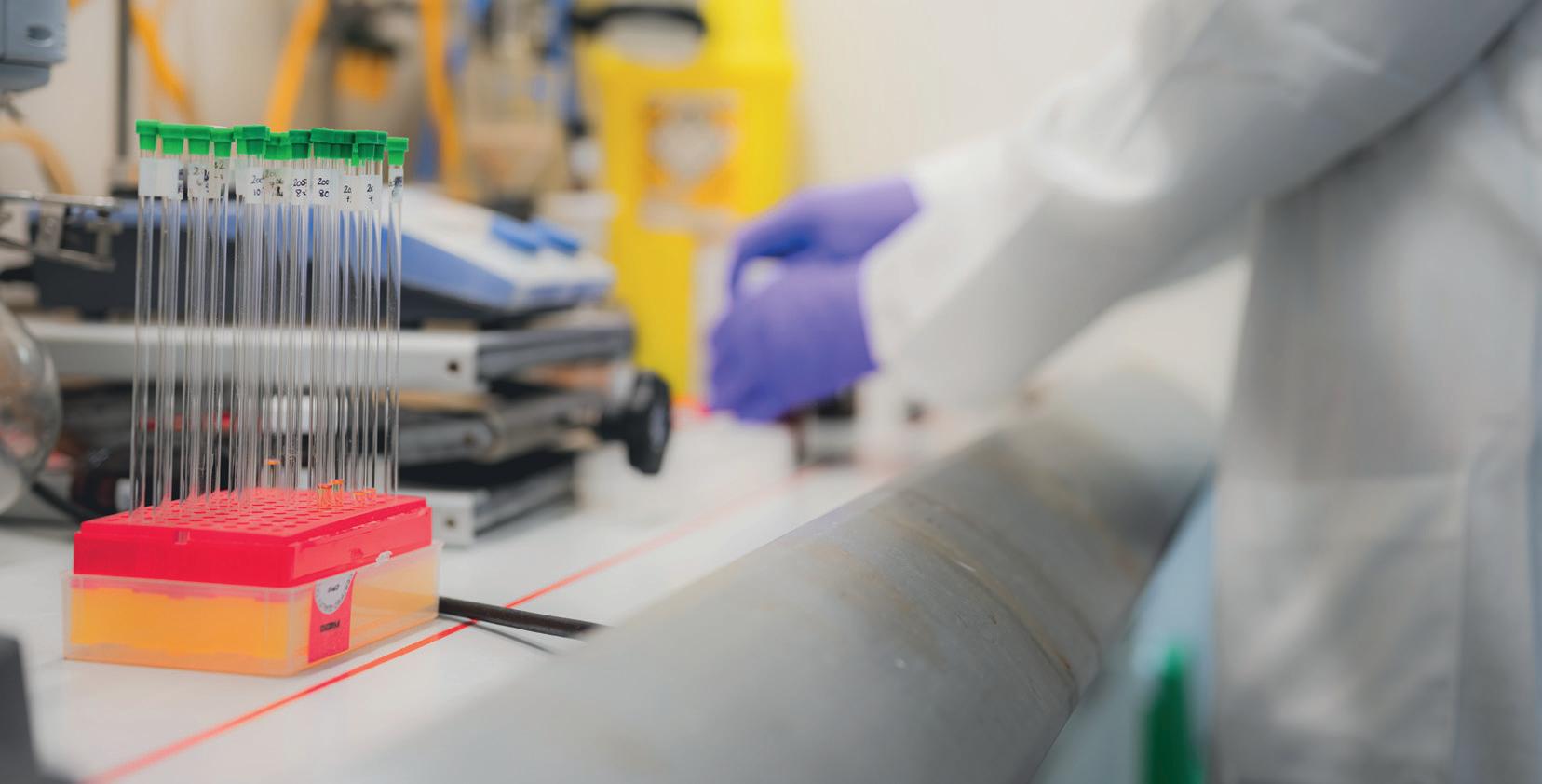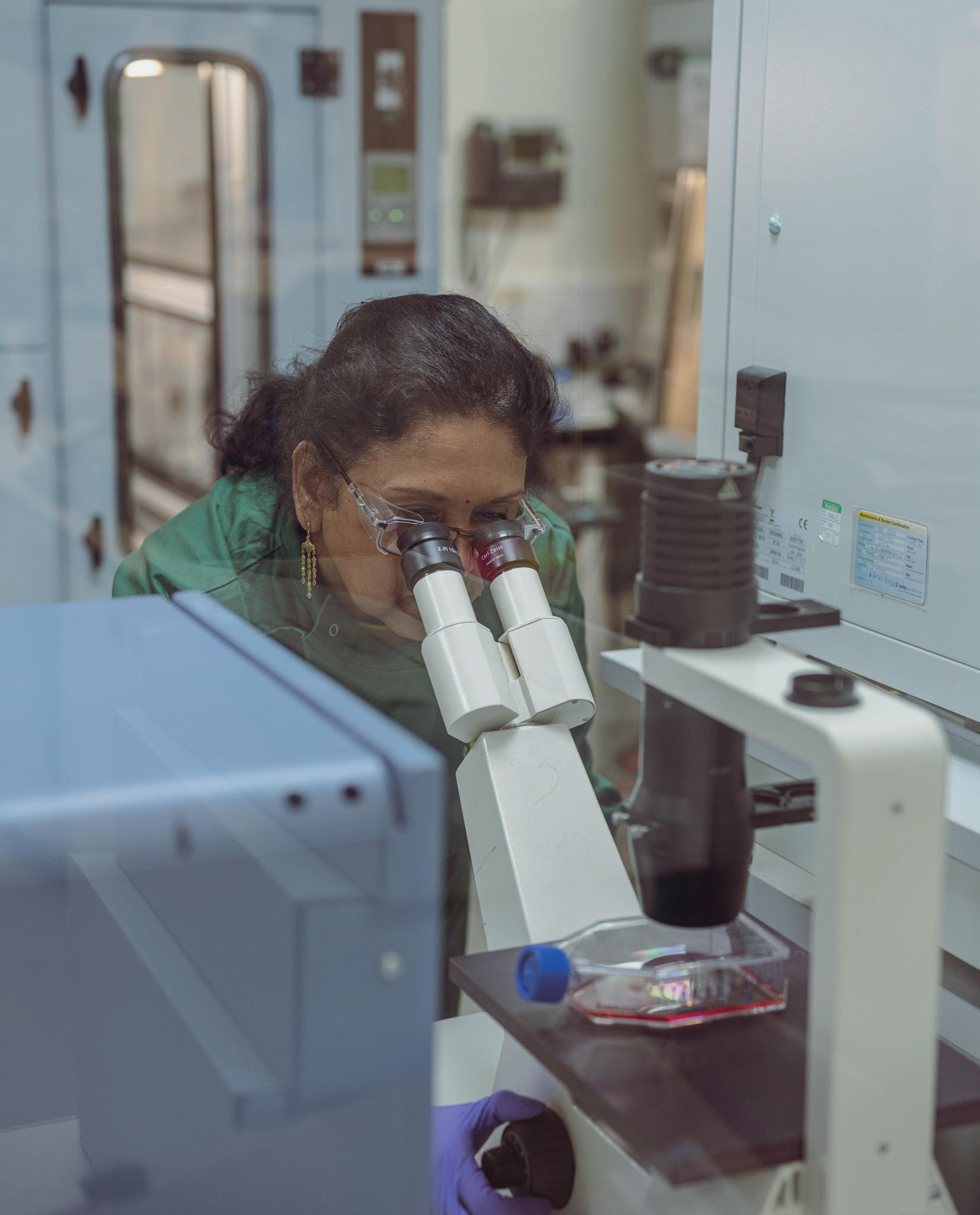
3 minute read
Introduction to the DDU
The Drug Discovery Unit (DDU) is unique: a complete ‘biotechstyle’ drug discovery engine delivering candidate drugs, de-risked drug targets and commercialisation opportunities across multiple disease areas within a UK university.
Our mission
Advertisement
To translate world-class biology research into novel medicines, for unmet medical need, efficiently and successfully through collaboration and innovation in drug discovery.
What we do
The DDU tackles unmet medical need through small molecule drug discovery, bridging the gap between academic scientific research and commercial and charitable drug discovery and development. We draw on the best of these worlds, employing highly skilled, experienced scientists from academic and pharmaceutical industry backgrounds, with a professional, pioneering approach to our work.
We have two core areas of activity
→ Anti-infectives drug discovery
→ Innovative targets and pathways
Anti-Infectives Drug Discovery
In Low- and Middle-Income Countries (LMICs), more than three billion people are at risk from diseases such as malaria, TB, leishmaniasis, Chagas disease, cryptosporidiosis and schistosomiasis. As well as these diseases which predominantly affect LMICs, COVID is still a major issue in these countries.
Existing treatments can be expensive, difficult to administer, unsafe and/or increasingly ineffective as the pathogens that underlie these conditions develop resistance. Our overall goal is to generate lead compounds suitable for further development with our partners and, ultimately, to identify candidate molecules for entry into pre-clinical and clinical development.
Innovative Targets and Pathways
Disease experts and academic researchers continue to discover new biological processes which could be drug targets for major clinical indications. However, these targets are very often not sufficiently validated for licensing into pharmaceutical company portfolios or for spin-out company investment. The DDU is committed to bridging this gap by developing chemical assets that can advance our understanding of the underpinning biology and, ultimately, establish proof of concept in gold standard pre-clinical models of disease.
How we do it
We collaborate with partners globally to identify potential drug targets, lead compounds, candidate drugs and novel tools and approaches to develop improved treatments for a wide range of debilitating and deadly diseases. The DDU has the full repertoire of professional, industry-standard expertise and infrastructure required for early-stage drug discovery. These disciplines work together closely within an integrated management structure.
Medicinal chemistry
→ Design, synthesis and development of drug-like compounds
→ Invested in new synthetic design and synthesis techniques
→ State-of-the-art equipment and methodology
Drug metabolism and pharmacokinetics
→ Integrated DMPK group
→ Supports hit and lead optimisation programmes
→ Industry standard in vitro and in vivo assays
→ High-value mass spectrometry equipment to analyse biological samples
Hit discovery
→ Comprehensive range of liquid handling and detector technologies; including nanolitre acoustic dispensing
→ Target-based and phenotypic screening technologies
→ Bespoke compound libraries
→ Multiple screening modlities and instruments
Bioinformatics
→ Management and analysis of biological data
→ Statistics, computational science, databases, algorithms
→ Building 3D models of protein structures
Structural biology and biophysical techniques
→ State-of-the-art protein crystallography infrastructure
→ BLI, SPR, NMR hit finding and validation techniques
Computational drug design
→ Druggability assessment of protein targets
→ Selection of compound libraries
→ Virtual screening
→ Analysis of screening hits
→ Compound design using protein structure
→ Optimisation of drug-like properties in design
Accelerating Innovation
The DDU benefits from being part of the Wellcome Centre for Anti-Infectives Research (WCAIR). Wellcome funding has allowed investment to overcome the challenges the drug discovery pipeline faces. WCAIR innovation has focussed on improving four key areas critical to successful drug discovery:
→ Compound Design: Predicting the properties and activities of compounds before they are made, based on coherent data sets to train algorithms, and computational expertise and methods to derive them.
→ Chemistry Design and Synthesis: Improved and broader methods to rapidly and efficiently make optimally designed compounds at a scale to address key project goals.
→ Assay Design: Physiological and disease appropriate in vitro assays and animal disease models that are predictive of human clinical outcomes, where appropriate taking advantage of state of the art imaging.
→ Data Analysis: Use all available data to build better design models through machine learning.
Key numbers
5 compounds in clinical development
By tackling these issues, we are impacting the whole drug discovery continuum to accelerate project progression (or closure) and thus increase the flow of candidate drugs. These improvements are available to others, through collaboration, knowledge exchange and training. Although WCAIR’s current focus is on leishmaniasis, Chagas disease and cryptosporidiosis, the ’toolbox’ of methods and approaches under development is applicable to other diseases.
Translational Funding
Strong partnerships with organisations funding scientific research for drug discovery has been fundamental to our success. We are grateful to Wellcome, the Bill & Melinda Gates Foundation, Medicines for Malaria Venture, the Medical Research Council of UKRI, Global Health Innovative Technology (GHIT) Fund, and the Drugs for Neglected Diseases initiative (DNDi), amongst others, for their continued support and encouragement. We align our research strategies and infrastructures with our funder’s aims and objectives and, together, deliver on our joint objectives to control or eliminate debilitating and fatal diseases.
Impact
Our impact is recognised not only by the progression of our compounds into pre-clinical and clinical trials with our partners but also by supporting partner academic groups to secure research grant funding to further explore disease biology using the tool molecules we produce.

6 new companies enabled with DDU assets
130 experienced translational scientists
9 assets licensed to pharmaceutical companies £100m secured in research funding










